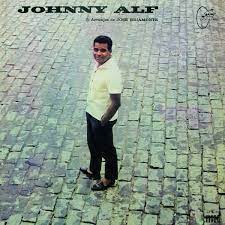
Daily Dose Of Jazz…
Johnny Alf was born Alfredo José da Silva on May 19, 1929 in Vila Isabel, Rio de Janeiro, Brazil and began playing piano at age 9. His father died when he was 3 and was raised by his mother, who worked as a maid to raise him. He attended Colégio Pedro II, receiving support from his mother’s employers who had appreciation for music. He was enrolled at the IBEU, Instituto Brasil-Estados Unidos, and it was there that he received his first formal musical training, studying classical piano with instructor Geni Bálsamo.
Influenced by Nat King Cole and George Sheaing, Frank Sinatra, Bing Crosby and Brazilian born Dick Fame, he eventually gained membership into the Sinatra~Farney Fan Club, a performers collective. Alf’s membership allowed him regular access to a piano as well as a group of musically sympathetic peers with which to play and experiment. They would finally get the payless opportunity to play in a few well known venues.
By 1950 he was pursuing a professional musical career and received his first professional break in 1952 when he was hired as the pianist at the newly inaugurated Cantina do César, owned by the popular radio host César de Alencar. With free musical reign. Johnny would receive frequent visits from pianist João Donato, vocalist Dolores Duran, and guitarist/vocalist João Gilberto who would sit in on the way to their gigs.
He would begin to combine Samba-cançãoes and foxtrots with American jazz styles. He would go on to record his first two albums, however, the recordings garnered no more than a pittance of recognition for Alf at the time, but would later in the early Sixties be hailed as the progenitors of the Bossa Nova style.
He continued to find nightly work in the Rio clubs and work with musical companions João Gilberto, João Donato, and the young pianist Antonio Carlos Jobim, all following him from venue to venue provided they could afford the cover fee. By 1954 he was performing regularly at the Hotel Plaza nightclub. Due to its haunted reputation Johnny was able to play his own compositions plus hold early evening jam sessions and these improvisatory collaborations that the harmonic and rhythmic structures eventually blossomed into the style now known as Bossa Nova.
Moving to Sao Paulo in 1955 he became the house pianist at a new club, Baiúca and formed a short-lived duo with double-bassist Sabá. Unfortunately the group only established a moderate following before Baiúca was closed down for health-code violations. In 1961 he declined the invitation to play at Carnegie Hall’s historic Bossa Nova Festival because he didn’t like the connotation bossa nova brought with it. That decision sent him towards obscurity and very little was heard from Alf, although he infrequently produce albums throughout the 60s and early 70s. He would continue to collaborate, record and perform to earn a living and eventually landed a position at a local conservatory of music.
Pianist, vocalist, composer and educator Johnny Alf, who is widely considered the Father of Bossa Nova, transitioned from complications caused by prostate cancer on March 4, 2010 in Santo Andre, just outside São Paulo, Brazil. This was his home for the last fifty years of his life. He left no immediate survivors.
More Posts: bandleader,club,history,instrumental,jazz,music,piano,vocal


